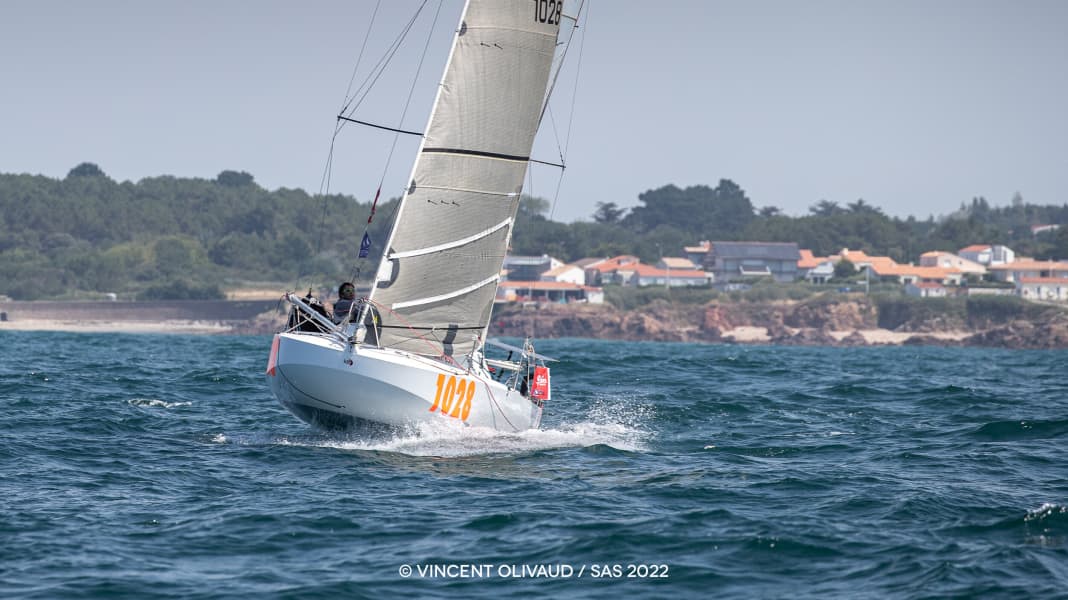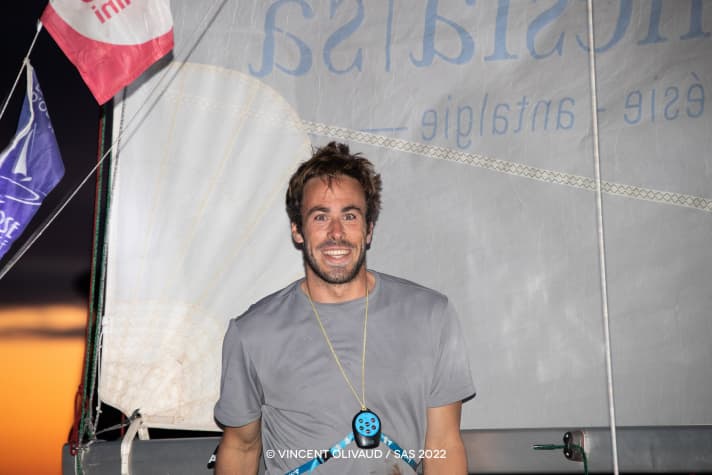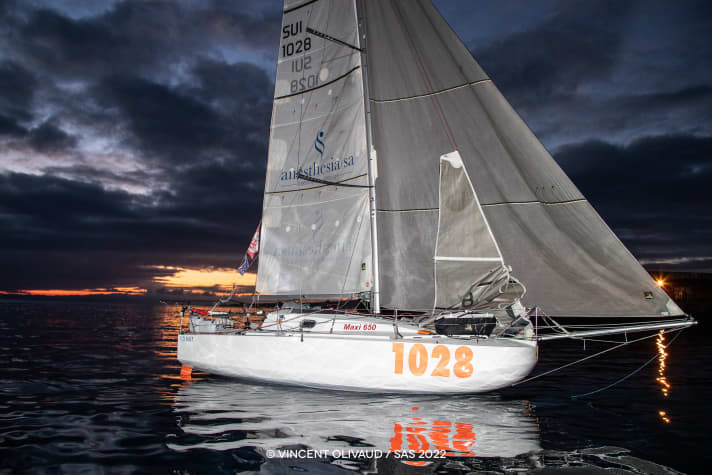
For more than three days, the mini sailors laboured off the Azores in an agonisingly calm. Memories of the Mini-Fastnet a few weeks ago immediately come to mind, where the scenario was almost identical shortly before the end: at boat speeds of less than one knot, the finish just wouldn't come any closer.
After a total of 10 days, 19 hours and 15 seconds, the time has come. The Mini with the orange-coloured nose number 1028 crosses the finish line. Pure relief and also great redemption for the Swiss Felix Oberle. He crowns an already strong and consistent race with a fantastic finish and is only beaten by the exclusively French podium.
After this nerve-wracking first leg of the mini classic, the starting signal for the second leg is due to sound tomorrow. In this interview, the solo sailor from the Alpine country reveals his plans for the return leg to Les Sables-d'Olonne, how he got into solo sailing in the first place and how he envisages his sailing future.

Congratulations on this top placing! It's back on the road tomorrow, were you able to really enjoy and celebrate your success?
Felix Oberle: We actually had a relatively good party, the atmosphere between the participants was really great. It was also possible to relax, the organisation showed us the island, it was nice. The boat is almost ready again, I feel good and am happy with my timing.
You narrowly missed out on the podium. Are you happy or annoyed?
I am satisfied. I was still ill in bed the week before. Of course, that wasn't the best preparation. The result is cool, the first three are really very good. Jean Marre and Julie Simon have done the Transat before, that's 8,000 miles ahead of me (laughs). So I'm already satisfied. On top of that, you also have to have a bit of luck in these conditions.
It was a race with lots of ups and downs in difficult conditions. Can you give us a brief summary? How did it go for you?
I'm not the strongest near the coast and had problems getting away. Then it was a case of heading towards Finistère. Tactically, it would have been better to turn south at the traffic separation scheme. However, because I was ill and relatively tired, I didn't trust myself to do this. The pressure of the required miles is pretty high, so the number one goal was to get through this stage. That's why I decided to ride through to the north, but I lost a lot in the process.
The next important point was to cross the back of the high. As our group was in the north, we crossed it too early, i.e. too far to the east. We were really unlucky and had no wind when we came out of it. I was already 50 nautical miles behind and was between 10th and 20th place. The main problem was that we had no wind when we left the high, while the others were still able to continue with four to six knots and a better angle.
I was then in pairs with Julie Simon, and we motivated each other to keep going and caught the next two fronts well. On the last one we were able to make good speed towards Graciosa on a clear course, while the others were travelling slowly downwind. For 48 hours we were maybe a hundred metres apart. That helps, so you can constantly compare yourself.
What really paid off was that we passed the island relatively riskily in the west. At the same time, the others had no wind in the north of Sao Jorge and an opposing current.

How did you experience the long lull at the end? Do you get nervous or rather bored?
It was frustrating for me at first. It was the same with the mini Fastnet, which was hard to accept. We don't know where the others are. We do get a classification every 24 hours, but that doesn't say anything about how the positions are distributed laterally. I actually quite like lulls, but I've never experienced one like this (laughs). For 50 hours we never saw more than three knots of wind and once we briefly saw seven, which was pretty intense.
Do you have something to do in such cases or do you remain fully focussed?
It was still pretty intense for me though, I was mainly trying to move the boat forwards. Apart from that, I listened to music from time to time and slept when I could. The aim was to make every inch of progress. You saw the island and wanted to get there, but then it took three more days for the last 50 miles.
How do you feel when you cross the finish line in the top five after a race like that?
As we approached the finish and I saw all the people on the AIS who were normally ahead of me, I already knew what was at stake. But then at the finish it's just such a huge relief. It was the first time I'd crossed such a long distance. The arrival is a really cool moment, regardless of the race.
I am now highly motivated. I've learnt a lot from these 1,200 miles, and it would be ideal to apply that directly. Otherwise, of course, I would always like to rest more. After ten days with so little sleep, you need a bit more rest, but that's the same for everyone, we're all in the same boat (laughs).
How did you get into single-handed sailing?
I more or less grew up on my parents' boat, there are pictures of me on the boat before I could even walk. But they were always regular weekend trips on the lake. I never sailed in regattas until I went to university, but I knew the Mini-Transat.
My parents also went on adventures as a couple or alone, and I learnt to sail with a small crew at an early age. Fresh out of school, I then joined a friend on a cruise around Ireland to the Shetland Islands and back for about five months. I was completely alone for over a month and a half, which led me to single-handed sailing.
Then I started racing in the sailing team at the University of Lausanne. I quickly got into teams and have been sailing there on an M2 catamaran for the last three years. I've saved a lot since university, and now the stars have aligned for the Mini-Transat (laughs).

Do you have a specific goal for this regatta, which starts next year?
I don't have a goal in terms of placement. My motivation is to organise the project on a professional basis and find out what I'm capable of. The further forward, the better, but I set myself more of a goal in terms of how I manage the project, how I learn and progress.
Do you already have plans or dreams for the future?
I'm focussing on this boat and this project at the moment, I don't know what's next. When you're in Lorient, you're already dreaming of the bigger boats (laughs).
But I don't want to look that far ahead. I'm open to new possibilities, but projecting too much now can also be disappointing. I'm very happy with the current project. I'm learning a lot, the environment and the people are even better than I had hoped. That's why I'm going all the way to the Mini-Transat, doing my best, and we'll see what happens next.
What else have you done today before heading back out on the water tomorrow?
I was out shopping for food and then I had two or three things to finish on the boat. Then just watch the weather a bit more closely before I go to sleep.
Do you have a specific goal for the second stage?
The goal is definitely to get the miles behind me again first and foremost. My current position is great, even if the conditions at the end had a lot to do with luck. I'm not going to give anything away for free; when we take part in a race, it's all about the result. Nevertheless, I'm not aiming for an exact place. It's the second time I've done this, a lot can happen again. I like being out there and if I do well, the result will come naturally.






Click here for tracking and to the Website of Felix Oberle (please click!)

